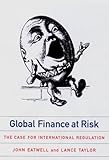Global Finance at Risk: The Case for International Regulation
Global Finance at Risk: The Case for International Regulation

Now in paperback, a "timely" (Library Journal) argument for an international body that will foster a more stable, viable global financial system. In Global Finance at Risk, now available in paperback, two economists whom John Kenneth Galbraith has hailed as "accomplished scholars of the first rank" propose a bold solution to the financial crises that threaten us all: a World Financial Authority with powers to establish worldwide best-practice financial regulation and risk management. Expansion of finance in industrialized economies, including that of the nineteenth-century United States, was accompanied by the same kind of turbulence now afflicting Asia, Russia, and Latin America. Then, the solution was to establish national banking and securities regulators, create deposit insurance, and empower lenders of last resort. But in our increasingly globalized times, an account opened at a local bank can be based on bad debt from anywhere in the world, including places outside the jurisdiction of those national agencies. And when banks fail, it is not only their account holders who suffer, but all of us. This is why, argue John Eatwell and Lance Taylor in this timely and urgent book, effective regulation of international finance is crucial to the economic health of all nations. Global Finance at Risk casts a welcome light on the deepening intricacies of world financial systems. Since the collapse of the Bretton Woods system in 1971 and subsequent free-float of currencies, the capital markets have been deregulated. But the benefits of international liberalization, according to John Eatwell and Lance Taylor in their boldly argued Global Finance at Risk, "have been tarnished by considerable costs"--namely, more volatile foreign exchange and domestic interest rates, a greater susceptibility to contagion, and the threat of destabilizing financial crises.
The problem with the current network of regulatory authorities, write the authors (Eatwell is president of Queens' College at Cambridge University and a member of Britain's House of Lords, and Taylor is a professor of economics at the New School in New York), is they offer too little, too late and just don't manage the threat of systemic risk. To rectify this hole in the soul of the capital markets, they propose (some might say fancifully) a World Financial Authority, to be built on the back of the Bank for International Settlements, which would spearhead and manage international capital-market regulation, make policy, oversee the markets, and provide an enforcement mechanism as necessary. The authors don't fuss: their superregulator would supervise all markets. They make the further case, very much against the current grain in OECD countries, for restrictions on short-term capital inflows to developing countries during time of crisis and for the "management" of foreign exchange rates between the U.S. dollar, euro, and yen.
Along the way, Eatwell and Taylor recap (at times controversially) various financial crises over the last 30 years and cover hot-button issues ranging from moral hazard, regulatory arbitrage, and value-at-risk modeling to the risks posed by the increasing complexity of derivatives and the need for greater international accounting standardization. The book does not discuss the Basel Committee's newly proposed capital adequacy framework or the structural changes altering the markets as a result of electronic trading. These omissions, however, don't detract from the authors' feisty argument that the international financial markets--with their "remorseless dynamism" and destabilizing prospect of contagion--need activist leadership rather than mere babysitting. --Nina Mehta

List Price: $ 15.95
Price: $ 9.40
Find More Finance Products
No comments:
Post a Comment